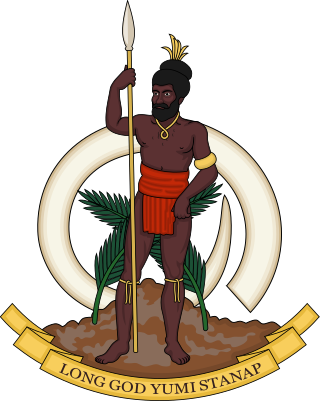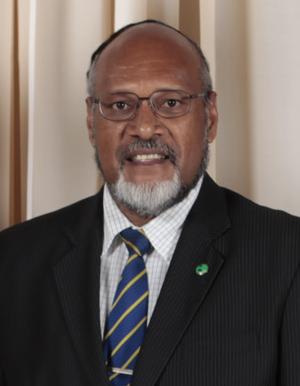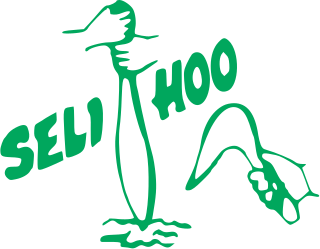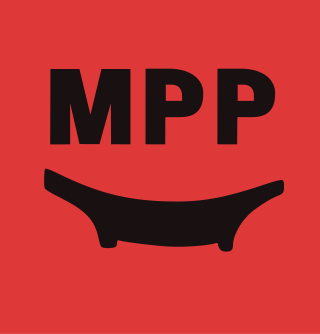Related Research Articles

The politics of Vanuatu take place within the framework of a constitutional democracy. The constitution provides for a representative parliamentary system. The head of the Republic is an elected President. The Prime Minister of Vanuatu is the head of government.

Edward Nipake Natapei Tuta Fanua`araki was a Vanuatuan politician. He was the prime minister of Vanuatu on two occasions, and was previously the minister of Foreign Affairs briefly in 1991, the acting president of Vanuatu from 2 March 1999 to 24 March 1999 and the deputy prime minister. He was the president of the Vanua'aku Pati, a socialist, Anglophone political party.

Ham Lin̄i Vanuaroroa is a ni-Vanuatu politician. He is a former MP from Pentecost Island in Penama Province. He was Prime Minister of Vanuatu from 11 December 2004 until 22 September 2008, and is the current Deputy Prime Minister since 16 May 2014. Lin̄i is the brother of Walter Lin̄i, one of the founders of the modern Republic of Vanuatu. Ham Lin̄i is the current leader of the National United Party (VNUP).

The Vanua'aku Pati is a democratic socialist political party in Vanuatu.

The National United Party is a political party in Vanuatu. It was founded by Vanuatu's independence leader Walter Lini when he broke away from the Vanua'aku Pati, alongside businessman Đinh Văn Thân. It is a social democratic party which traditionally received most of its support from English speakers.

The Union of Moderate Parties is a liberal political party in Vanuatu founded in 1981. At the last general election, held on 22 January 2016, they won 9.73% of the vote and 6 seats. It is currently headed by Ishmael Kalsakau.

The Melanesian Progressive Party is a political party in Vanuatu formed after an internal leadership struggle within the Vanua'aku Pati in the late 1980s. MPP founder, former Prime Minister Barak Sopé, was at that point the secretary general of the VP, and the struggle, as well as his expulsion from the VP and the Parliament for taking part in a protest against the government’s decision to close the Urban Land Corporation (ULC) in April 1988, resulted in him forming the MPP. The party's program is relatively similar to the VP. Despite its small number of seats it has been important in setting up coalition governments since the 1990s.

Donald Masike'Vanua Kalpokas was a Vanuatuan politician and diplomat who twice served as Prime Minister of Vanuatu.
Maxime Carlot Korman is a Vanuatuan politician, formerly serving as the speaker of the Parliament and formerly as acting president. He served as the prime minister of Vanuatu for nearly five years, first from 16 December 1991 to 21 December 1995 and again from 23 February 1996 to 30 September 1996. He was a member of the Union of Moderate Parties during his terms as prime minister, but now leads the Vanuatu Republican Party. He was the first Speaker of Parliament after independence, from July 1980 to November 1983, and also served in that capacity just before independence.

General elections were held in Vanuatu on 2 September 2008. In July the Melanesian Progressive Party requested that they be postponed, contesting the constitutionality of the Peoples Representation Act No. 33 of 2007, which allegedly enabled voters in certain constituencies to vote in two constituencies. The Principal Electoral Officer, Martin Tete, confirmed that the election would take place on 2 September, as scheduled. The day was declared a national holiday, to encourage people to vote.

Ati George Sokomanu, is a Vanuatuan politician who served as the first president of Vanuatu from 1984 to 1989.

The French Republic and the Republic of Vanuatu have long-standing bilateral relations which have varied over the years between tense and amicable. Vanuatu, then known as the New Hebrides, was a Franco-British condominium from 1906 to 1980, and maintained formal relations with both of its former colonial masters after gaining independence. Franco–Vanuatuan relations were rocked by a series of crises in the 1980s, and broke down completely on several occasions, with Vanuatu expelling the French ambassador in 1981, in 1984 and in 1987. Relations improved from the 1990s onwards and, today, France provides development aid to Vanuatu. The two countries also share amicable economic and cultural relations; both are members of the Organisation internationale de la Francophonie.
Jean-Marie Léyé Lenelgau was a Vanuatuan politician and the president of Vanuatu from 2 March 1994 to 2 March 1999.

General elections were held in Vanuatu on 30 November 1987. Ni-Vanuatu voters were invited to elect the 46 members of an expanded national Parliament, which had previously held 39 seats.

General elections were held in Vanuatu on 2 December 1991. Ni-Vanuatu voters were invited to elect the 46 members of the national Parliament.

General elections were held in Vanuatu on 30 November 1995. Ni-Vanuatu voters were invited to elect the 50 members of the national Parliament.

General elections were held in Vanuatu on 6 March 1998. They "were held under the shadow of a state of emergency and were accompanied by an unusually low turnout rate", with only 64% of registered voters casting a ballot.

Early general elections were held in the New Hebrides on 29 November 1977 following the dissolution of the Representative Assembly elected in 1975 due to the Vanua'aku Pati blocking its work in order to protest the inclusion of members elected by the Chamber of Commerce.

This is a list of foreign ministers of Vanuatu.
A by-election to the Parliament of Vanuatu was held in the constituency of Port-Vila on 15 October 2015. It followed the death of sitting MP Edward Natapei, of the centre-left Vanua'aku Pati. Natapei died after a long illness in July. Although Port-Vila is a multi-member constituency, only one seat was vacant, and therefore only one new member was elected.
References
- ↑ Vanuatu: élections du 30 novembre 1987, Inter-Parliamentary Union
- ↑ Miles, William F.S., Bridging Mental Boundaries in a Postcolonial Microcosm: Identity and Development in Vanuatu, Honolulu : University of Hawaii Press, 1998, ISBN 0-8248-2048-7, p.24
- ↑ "Sope's desperate gamble falters", Pacific Islands Monthly, September 1988, p. 10
- ↑ Vincent Boulekone, «La politique du Tan-Union» in Howard Van Trease and Michelle Craw (dir.), La politique mélanesienne: Stael Blong Vanuatu, University of the South Pacific, 1995, pp.207 et seq
- ↑ Roland Rich, Luke Hambly and Michael G. Morgan, Political Parties in the Pacific Islands, Australian National University Press, 2008, p.123
- 1 2 "Political crisis in Vanuatu", Australian Foreign Affairs Record, December 1988, pp.541-542
- ↑ "Poll will set Vanuatu's power base", The Canberra Times, 12 December 1988, p.6
- 1 2 "Sope, Sokomanu guilty of mutiny and sedition", Pacific Islands Monthly, March 1989, p.10
- ↑ "Republic of Vanuatu Official Gazette No. 33" (PDF). 19 December 1988.
- ↑ "Republic of Vanuatu Official Gazette No. 30" (PDF). 18 December 1989.
- ↑ « Vanuatu: élections du 2 décembre 1991 », Inter-Parliamentary Union